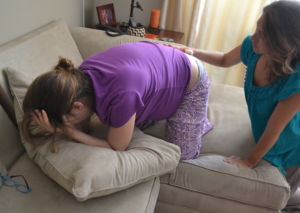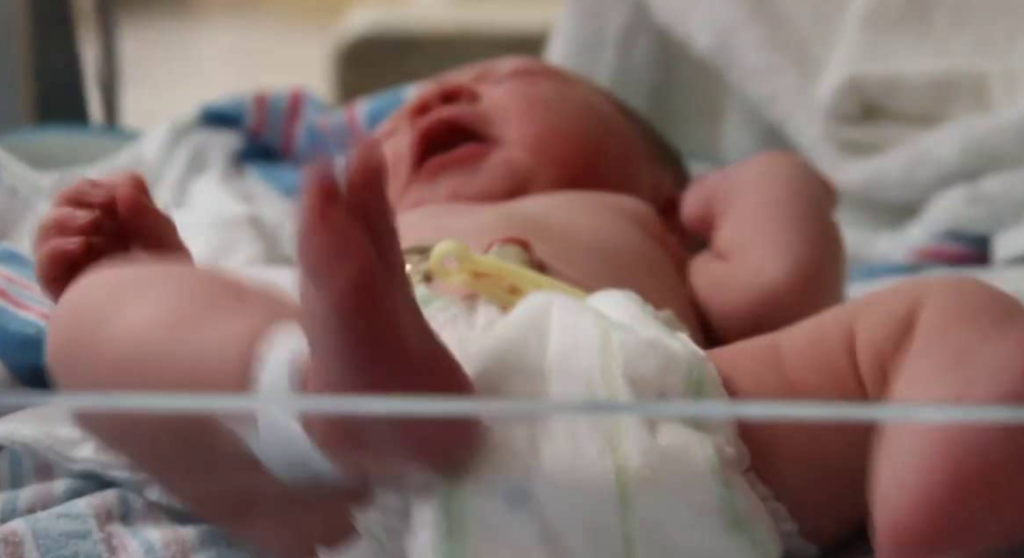BABY DALLAS — Organized Labor
MOTHERING FOR MOTHERS
Doulas ease childbirth fears with nurturing support and information
By Elaine Rogers
There are always moments in an expectant mother’s life when those dreamy imaginings of how wonderful it will be to become a mom are overwhelmed by waves of frantic fright regarding motherhood’s ultimate initiation: labor.
True to its name, labor is hard work, and the uncertainties of the process are enough to diminish even the most serene mother-to-be’s best Mona Lisa smile. Hope and help is being found, however, in a surprisingly old-fashioned form, with growing numbers of women seeking out the support and services of doulas — labor assistants named for the ancient Greek servants who attended to the lady of the house in ancient times.
 “Childbirth is scary for women,” says Renee Woods, a former Dallas-based OB-GYN who has been on “both sides of the coin.” Seven years ago, she hired long-time Dallas doula Linda Worzer to assist her during a personal (and successful) attempt at a vaginal birth after cesarean (VBAC), and now recommends the doula experience to “all women.”
“Childbirth is scary for women,” says Renee Woods, a former Dallas-based OB-GYN who has been on “both sides of the coin.” Seven years ago, she hired long-time Dallas doula Linda Worzer to assist her during a personal (and successful) attempt at a vaginal birth after cesarean (VBAC), and now recommends the doula experience to “all women.”
“One of the greatest things the doula brings to the table is an ability to interpret what’s going on with the mother and to know what kinds of things to say and do which will help her relax and motivate her to work through her fear and pain.”
Modern-day birth doulas attempt to facilitate a more relaxed, nurturing birth experience by staying with the mother and being a constant source of informational, physical and emotional support throughout the ups and downs of the entire childbirthing process. “It’s about mothering the mother,” says Worzer, who teaches Bradley childbirth classes through her business Natural Beginnings and has been working as a doula since 1983. “In the typical hospital birth, the couple is left on their own a lot of the time. Nurses check in on them from time to time so they can call the doctor to come in when it’s time to catch the baby, but they can’t stay in the room with the couple because they’ve got other births to attend to. The doula fills in that gap.”
Sometimes “laboring with” their clients at home prior to the hospital stint, doulas also meet with couples a month or two in advance whenever possible to help them design their individual “birth plans,” discuss issues and concerns the expectant mothers may want to talk about with their caregivers and even attend prenatal doctor’s appointments with them.
“A couple may only want a doula to be there for them at the delivery,” explains Dallas-area doula Korinne Hendrix. “Others may need help during three days of false labor or want assistance throughout the latter stages of their pregnancy. … So, we customize our care to their needs and do as much or as little as they want us to.”
Trish and Jerry Deutsch of Plano asked doula Wendy Blumberg to attend the birth of their second child four months ago after having found the birth of their first son three years earlier “a bit overwhelming.”
It’s one thing when you’re sitting in the childbirth classes to discuss the breathing techniques,” Trish says. “But when it’s the middle of the night and the labor pains are coming and going, it’s hard to remember just what kind of breathing you’re supposed to be doing. … Wendy came in with her whole bag of tricks and just took charge. If she hadn’t been there, I think at a certain point I would have started panicking.”
“We’re equipped with a toolbox of coping techniques,” says Hendrix, explaining that the “tools” range from visualization exercises and aromatherapy to back and foot massage, birthing balls which the laboring women bounce on and special music tapes. “We support both the laboring woman and her partner. Sometimes dads feel so helpless watching their wives be in such discomfort, and they’re usually very happy to have someone there who’s been through it before to guide them and let them focus on providing the emotional support without worrying if they’ve forgotten a certain breathing technique.”
Adds Blumberg, who has four children of her own: “I’ve got my little crockpot of herbs and my heel massages and things like that. There are a lot of things you can do to help a client get her endorphin levels up, and then she’s more equipped to handle things. … I think a lot of women today want to have natural childbirths, they just aren’t encouraged to try it and they don’t think they can do it.”
“When a woman in childbirth is attended by a knowledgeable woman,” Worzer adds, “the outcomes are better. The research on this is very clear.”
For more than a decade, reports published in the Journal of the American Medical Association (JAMA) have documented the benefits of doulas on physical outcomes of births and the emotional well being of mothers and infants. The national organization, Doulas of North America (DONA) especially touts 1992 research that births attended by doulas reduced cesareans by as much as 50%, shortened the length of labor by 23%; reduced requests for epidurals by 60% and use of both forceps and pitocin by 40%. Additionally, doulas are said to increase levels of maternal satisfaction and self-esteem, mother/infant bonding, partner participation and successful breastfeeding.
“I think women just want someone to tell them that what they’re experiencing is normal and that women have been doing this for years and years,” adds Sherry Thain, a certified professional midwife, doula and mother of seven who says today’s doulas have the same role that grandmothers, mothers and other village matrons had in centuries past. “Just having an older woman in the room who’s been through it before is such a help to them.”
Although not trained to perform medical procedures themselves, Dallas area doulas say they are familiar enough with them to “translate technical information” and increase their clients’ understanding of the clinical aspects of their childbirth experiences.
“One of our job descriptions is to facilitate communication,” Hendrix adds, explaining that laboring women often get confused and increasingly anxious during the pre-delivery phase when medical personnel are checking in periodically and providing limited or intermittent information.
“We can help explain things or encourage caregivers to elaborate on their explanations because a lot of women are a little bit intimidated by their doctors and don’t ask all the questions they want to. When they’re tired and uncomfortable, the explanations may seem even more unclear, and they can use the extra help in sorting out the information that’s been presented.”
A common perception among expectant mothers, Worzer says, is that only women planning on natural childbirth may be attended by a doula.
“A lot of women think that,” Hendrix adds, “but whether a woman does or doesn’t utilize pain medication in her birth experience should be her decision and her decision only.”
Worzer believes that if a woman wants an epidural, “she has every right to it,” but she worries that few women are given the opportunity to make informed decisions about them. “For example, it’s very common to spike a temperature with it and then be separated from the baby because the medical personnel fear an infection and they don’t want the baby to be exposed,” she says. “Most women don’t know that before they have the epidural, and I think they should.”
Woods echoes this sentiment, noting that our culture has developed into one where “complete medical intervention (in childbirth) is the norm.” Her Irving-based gynecological practice focuses on natural methods of wellness and healthcare, and she offers the opinion that having a doula is almost always beneficial, even for someone who has to have a C-section. “When an emergency situation develops, the woman is usually left wondering what happened, after the fact,” she explains. “That extra emotional support really helps them get through that.”
Adds Worzer: “Despite today’s emphasis on medicated births, I think a growing number of women are rediscovering that doulas can be an intrinsic part of the childbirth experience.”
Considering the amount of time doulas often spend with their clients in the weeks preceding a birth, costs are surprisingly reasonable. Rather than billing by the hour, most doulascharge a flat fee ranging from $200 – $500. “But ur philosophy is that any woman who wants a doula should be able to have one regardless of the ability to pay,” Worzer says. “That’s why we’re working very hard to develop volunteer programs at area hospitals.” At present, Worzer says thereare 50 or more doulas practicing in the Dallas area and most will barter, exchange services andeven do pro bono work for those who can’t afford the fee. Hendrix says newer doulas attempting to earn certification from organizations like DONA and the International Childbirth Educator’s Association (ICEA) often attend births for free in order to gain the extra experience.
“I don’t think any of us would ever turn anybody away based on the ability to pay,” says Blumberg. “It takes a really caring person to do this work, and most of us feel too strongly about a woman’s right to have this kind of help.”
For a listing of doulas in a 45-mile radius of your home, e-mail AskDONA @aol.com or call DONA at 206-324-5440. Locally, doula referrals are available from Natural Beginnings (972-699-3921), N. Texas Doulas (972-517-4412) and Your Pregnancy Matters (972-475-6556).
Obstetricians often have business cards of local doulas on hand, and websites with helpful information about doulas include www.childbirth.org (chbirth@flash.com), www.DONA.com, and www.labordoula.com.
The Magic of Midwifery
Why do women choose midwives?
As a family nurse practitioner, Norma Hilsmann of Dallas had witnessed her fair share of childbirths. When it came to having her own child, however, she wanted something different.
“I wanted it to be a family event, not a medical event,” she says, explaining why she chose to deliver with certified nurse midwife Cherie Boettcher of Dallas’ Birth and Women’s Center in August. And from her joyful recollection of giving birth to a 9 1/2-pound daughter without medication and in an atypical and intimate setting, it’s clear that the personal care she found at the birthing center was the perfect choice for her.
Ann L. (last name omitted for privacy purposes) of Dallas chose a midwife as her caregiver this year — her choice stemming from a desire to be more active participant in the birthing process than she had been three years earlier when her first son was delivered by a conventional obstetrician whom she later discovered ran “one of the more interventional practices in town.” With an epidural, a large, painful episiotomy, extensive bruising from a forceps delivery and a nurse who “broke her water” without informing her beforehand, Ann says it was a “rather violent birth” which left her feeling “somewhat violated,” and she was determined not to repeat the experience. When her second son was born five months ago, certified nurse-midwife Elizabeth Fairchild of the Renaissance Women’s Health Associates in Dallas “labored with” Ann and her husband throughout the entire process, helping her through a natural delivery the two-time mom describes as “the most powerful, creative experience of my life.”
Her story, Fairchild says, isn’t all that unique.
“We see a lot of women who felt assaulted by their earlier birth experiences,” she says. “It seems to be a question of whether the birth belongs to the person or to the care provider, but there really shouldn’t be any question about that.”
Hilsmann concurs.
“It’s your body, your baby and your birth experience,” Hilsmann says, “yet most women have their babies in positions that are comfortable for the doctors. That just doesn’t make sense to me.”
Charity Lankford of Dallas says most women hardly believe her when she tells them about her birth experience at the Birth and Women’s Center. She bore her 8 1/2-pound baby boy in a squatting position because that’s what was comfortable for her, spent portions of her four hour labor walking and sitting in a jacuzzi bath, and had 14 family members present who clapped and cheered when the newborn grabbed her husband’s finger in the first few moments of life.
It was such a special family event,” she explains. “They handed the baby right to me and never took him from me, not even while they were doing the tests. … It was just real intimate, real safe and real comfortable. I’d never want to do it any other way.”
The common denominator here is that these women were seeking more intimate birth experiences than they expected to find in the traditional hospital setting, but they also wanted access to the safeguards that come with a hospital birth. A desire for more control in designing what by all rights should be one of the most important and memorable events of their lives also made midwifery a logical choice.
Not nearly the rarity in other countries as it is in the U.S., midwifery is based on the premise that women should be partners in caring for themselves through pregnancy and childbirth, and that medical intervention is never routine. Although the number of women consulting nurse-midwives increased ten-fold between 1975 and 1995, only 5% of U.S. births are attended principally by midwives, as compared to 75% of European births. Meanwhile, according to published studies in the Journal of the American Medical Association, physician-atended hospital births have never been shown to be safer than midwife-attended home births for women with normal pregnancies.
“This part of the country is resistant to midwifery,” says Boettcher, “but it’s not that rare in other parts of the country and especially on the east coast. In Europe, midwife-attended births are the norm rather than the exception.”
“I haven’t figured out yet why there are so few midwives in Dallas,” adds Colleen Newman, a certified nurse midwife with Midwives, Inc., a midwifery clinic serving medicaid patients at Columbia Hospital Dallas/Southwest. “I moved here from Atlanta a year ago, and they were very popular there.”
“There aren’t many local OB-GYNs willing to incorporate midwifery into their practices,” says Fairchild. “They see it as a competitve field instead of a collaborative one.” At Renaissance Women’s Health Associates, Fairchild and CNM Susan Akins work in tandem with obstetricians Margaret B. Christensen and Audry L. Graham and have hospital privileges at Baylor Medical Center in Dallas. Christensen and Graham also serve as physicians on call to the midwives at the nearby Birth and Women’s Center.
“I was very comfortable with the doctors (at Renaissance),” adds Ann L., “but the midwives can spend more time with you and they have the doctors for back-up. Personally, that just seemed a better way to go.”
Fairchild estimates that about half of her clientele approach Renaissance because they’re specifically looking for a midwife. “The others may be more comfortable going to the docs,” she says, “but we think it’s all about giving women good choices.”
She adds: “Wherever the go, women should be able to get the kind of care they want.” To insure it, she recommends asking “many, many questions,” inquiring about a caregivers’ philosophies and common practices regarding such specific issues as episiotomies, anesthesia options and potential side effects, and their side effects, delivery positions, IVs, fetal monitoring practices, etc.
“You may want to know whether they usually ‘break the bed’ for delivery or if you can choose your position? Are interventions done routinely, and how are those choices made? What happens after the birth? Do they give the baby to the mother immediately? Do they wait to cut the cord or do they just do it and then take the baby off to get cleaned up? … If things are progressing normally, how long will they let a woman continue to push? … Nothing is too trivial to ask about.”
Ann L. agrees that expectant mothers should equip themselves with as much information as possible about the many nuances of childbirth. She and her husband took a Bradley childbirth education class and says the benefits included effective relaxation techniques and knowing “what kinds of questions to ask your caregiver — and how to ask them.” Vague answers or inadequate explanations, she adds, lead to potential misunderstandings and dissatisfaction with the birth experience.
“Labor is sort of like life,” Fairchild says. “You plan for what you want, but it doesn’t necessarily go that way, so you have to be prepared to deal with what happens as it comes. The more information you have up front, the better.”

